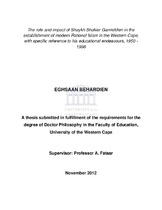| dc.contributor.advisor | Fataar, Aslam | |
| dc.contributor.author | Behardien, Eghsaan | |
| dc.date.accessioned | 2014-07-15T12:34:07Z | |
| dc.date.available | 2014-07-15T12:34:07Z | |
| dc.date.issued | 2012 | |
| dc.identifier.uri | http://hdl.handle.net/11394/3466 | |
| dc.description | Philosophiae Doctor - PhD | en_US |
| dc.description.abstract | This thesis discusses the impact of modern Rational Islam on the Muslim community of the Western Cape between 1950 and 1996. It is particularly concerned with the role of Shaykh Shakier Gamieldien in establishing and propagating this discourse in the region through the use of education as his means of propagation. The study defines modern Rational Islam as a discourse that emerged as a response to the incursion of modern Western culture into traditional Muslim regions during the 19th Century. The study further reflects on the local conditions in the Western Cape and assesses the progress
that modern Rational Islam had made under Gamieldien’s guidance in the period immediately after the Second World War. It investigates the negative impact that the forced removals of the community of District 6 from their urban homes in Cape Town had on Rational Islam who had lived in this area. It explores the emergence of alternative interpretive and discursive tendencies in the Townships and the apathy of the rationalists during this period. Two issues come under critical scrutiny in the thesis in order to provide clarity on the changing strategy used by Rational Islam during period of forced removals. First, the creation of new structures that could be employed for purposes of Islamic education within the rational discourse. The second was its attempt to reach a wider audience because of the destruction of its primary base in District 6. In assessing the impact of Rational Islam on the community of the Western Cape consideration is given to the changing contexts that existed between 1950 and 1996. The thesis examines the effect of the disintegration of the Muslim community and then the emergence of other discursive tendencies in the townships on Rational Islam. It also considers the indirect influence that Gamieldien’s discourse had on the other Islamic discursive tendencies in its assessment of Rational Islam’s impact. The study is based on qualitative research methods, mostly oral interviews with groups of students who studied and worked with Gamieldien as well as with individual informants such as
family members, friends and his leading students. This thesis investigates the emergence and impact of Rational Islam in the Western Cape and the contribution made by Shaykh Shakier Gamieldien in its establishment in this region. It further investigates the role of education as used by Gamieldien as a means of propagating modern Rational Islam as an accepted local Islamic discourse. | en_US |
| dc.language.iso | en | en_US |
| dc.publisher | University of Western Cape | en_US |
| dc.subject | Shaykh Shakier Gamieldien | en_US |
| dc.subject | Rational Islam | en_US |
| dc.subject | Western Cape | en_US |
| dc.subject | 1950-1996 | en_US |
| dc.subject | Education | en_US |
| dc.title | The role and impact of Shaykh Shakier Gamieldien in the establishment of modern Rational Islam in the Western Cape, with specific reference to his educational endeavours, 1950 - 1996 | en_US |
| dc.type | Thesis | en_US |
| dc.rights.holder | University of Western Cape | en_US |

